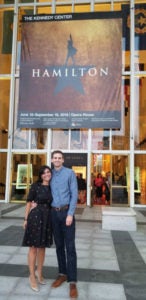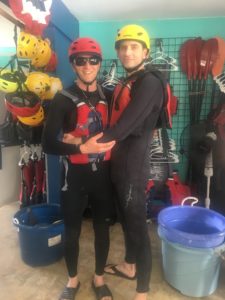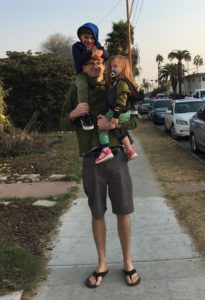 Tell us a little bit about yourself.
Tell us a little bit about yourself.
Though I was born in Morgantown, WV, I moved to California when I was 2 years old. I grew up in Northern California (before it was “Silicon Valley”) and went to college at UC Berkeley and medical school at UC Davis. After medical school, I did residency and a chief resident year at Loyola of Chicago followed by a fellowship in pulmonary and critical care medicine in the Harvard Combined Fellowship Program (we split our time evenly between MGH, Brigham and Womens’, and Beth-Israel Deaconess). I started at UVA in 2015 and have been building a career as a “pulmonary vascular medicine” specialist (as an aside, that is not a real thing, I just made it up) with footprints in our acute pulmonary embolism service, the pulmonary hypertension service line, and the hereditary hemorrhagic telangiectasia (HHT, aka: Osler-Weber-Rendu syndrome) clinic.
Why healthcare?
I think that the interesting thing about this question is that (at least for me) its answer is something that is in perpetual evolution. Life takes you where it wants to take you and you have to be fluid enough to go with it. I wanted to be a physician for as long as I can remember. The one constant through that desire is that I am, at heart, a socially awkward nerd – always have been, always will be. Socially awkward nerds do really well as healthcare providers because they possess a certain skill set that allows them to stay engaged in the sciences but grounded enough to doubt themselves. This manifests in a drive to always work hard to find an answer where there may never be one. I am in healthcare because I am a socially awkward nerd.
What brought you to Charlottesville?
When I finished my fellowship in Boston, I thought I was going to be more of a traditional research-physician and I worked at the NIH for 2 years looking at lipid trafficking in the lung and smoking-related lung injury. I was terrible at it for many reasons. At the time, my wife was in grad school in Baltimore and I was looking for jobs when a friend of mine suggested looking at UVA because it was “only 45 minutes away.” The Division was hiring, I was looking, and so the stars aligned themselves. After being here only a few months of being hired,  I quickly realized how fortunate I was to be here. UVA has been a great home for my career and professional development.
I quickly realized how fortunate I was to be here. UVA has been a great home for my career and professional development.
What excites you about your work?
People. I think that I really enjoy hearing about people’s stories, the choices they have made, the external factors that have shaped their paths, how (and why) they think, and the full complex range of things that makes people, people. The exciting thing about being a physician in an academic setting is using what you have learned about the human experience and applying it in a way that can make someone’s life better.
Next life?
Same, but a better husband and two inches shorter.
What are you usually doing in your spare time?
My children are 4 and 2 years old. Needless to say, there is not a ton of time for “personal spare time.” I used to play a lot of fast-pitch, wooden bat, adult baseball prior to the kids. I am hoping to get back to that this (maybe next) spring/summer.
 How did you meet your partner?
How did you meet your partner?
As I was finishing college, I ended up breaking my hand and so couldn’t type (on a typewriter back then) my applications for medical school. As a buffer between my time in college and medical school, I did research evaluating pregnancy prevention programs in California at UCSF. My wife ended up being my boss (or maybe better to say “my boss ended up being my wife?”).
Best advice anyone ever gave you?
In recent memory, that came from none other than Dr. Rosner. No really, it’s the truth. When I first got hired at UVA, Dr. Rosner told me “it’s okay to say ‘no.’ In fact, I want you to say ‘no.’”
In a vibrant community like UVA it is really easy to want to fall in love with all the cool projects other folks have going on. When those same folks ask you for your help, it is really hard to not overextend yourself.
What about you would surprise us?
I am a pretty mediocre driver.
Filed Under: News and Notes
